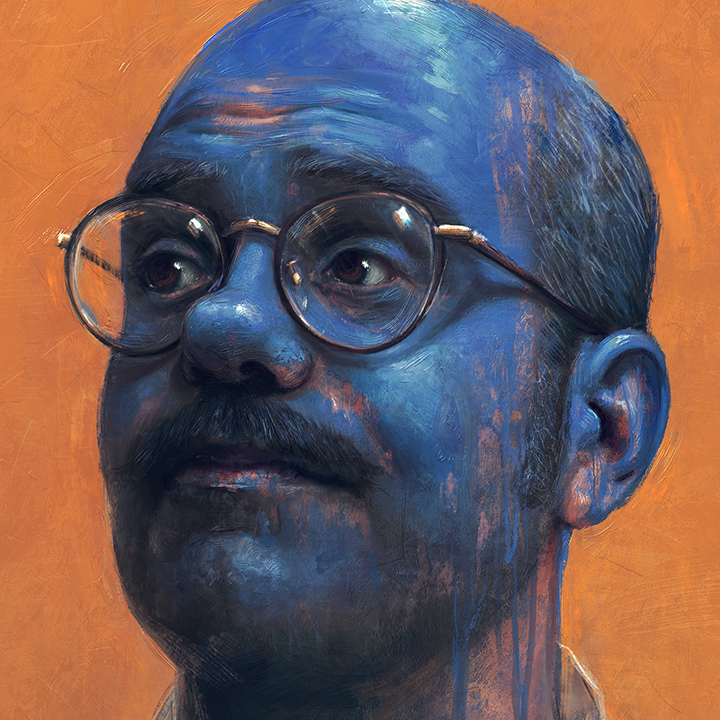:blob-no-thoughts:
Dibs on being a chickenhead. Blade runner coming true in our lifetimes
i'm still trying to cope with the fact that no matter that i'm vacced because of my job i'll likely 100% get covid eventually and have a good chance of literally losing a chunk of myself forever and they cry about the fucking economy.
Capitalism alienates you from your labor, from your community, from yourself, and even from your higher cognitive functions. If America's leaders looked the other way in the 20th century as people were literally lobotomized and were affected by lead paint, why would they care about the poors getting dumber? For the wealthy, this is an absolute win.
America’s leaders looked the other way in the 20th century as people were literally lobotomized
the PMC are the leaders of science policy https://en.wikipedia.org/wiki/Rosemary_Kennedy#Lobotomy
Boomers had lead poisoning shaping their thinking and the ideological makeup of society for decades. We'll have covid brain.
:party-blob:
That was exactly my first thought too. The effects on society from this over the next few decades could be profound and wide-ranging, comparable to mass lead exposure in the 20th century. Making a huge subset of the population even just a little dumber is a very, very big deal.
We took the boomer brain, and we doubled it! Errr, halved it? Who knows! Let's go to Applebee's!
My abuela got years worth of Alzheimer's in a matter of weeks. She can no longer live or do anything alone. It's been devastating to my family.
When the first reports came in that it wasn't a respiratory virus so much as it was a generalised cardiopulmonary and cardiovascular virus, I went from "this is a more serious flu I should avoid" to "we are trapped in the belly of this horrible machine and the machine is bleeding to death". So many systems are fed by smaller blood vessels, so many ministrokes can go undetected, most western lifestyles already damage the cardiovascular system and there was no telling what would be deprived of blood and oxygen if I got it. When I did get a mild case and realised how profound the sensory loss was, it being a neurological virus became just as terrifying. Neurological damage is just as chaotic as a bloodstream filling with clots.
Neurological damage is just as chaotic as a bloodstream filling with clots
It's even worse. We have pretty decent meds to prevent clotting or break them up.
:joker-troll: wot if i told you the pandemic is simultaneously stressing primary/preventative care while driving rural GPs to cities and causing a mass healthcare workforce exodus? wot if i did?
The big spooks for me are secondary and tertiary impacts. We only have decent meds to prevent clotting when it's clinically addressed for acute issues or stuff like aspirin for chronic risk. We can break them up certainly, but whenever I've pushed TPA it's within a strict four hour window with a full ER team and a helicopter on standby to get them to a neurosurgeon if needed. When we bust clots that can be a generalised drug which suddenly busts all clots, causing really serious issues that need a lot of resources. They're going into ORs with a massive backlog even for serious trauma patients. They're competing for ICU beds with COVID patients that are there longer than other patients needing more interventions from fewer nurses.
Thanks, this was really informative. Had no idea anti clotting interventions were that dangerous.
driving rural GPs to cities
I haven't heard about this, is it GPs just giving up on their patients after they refuse treatment or something else?
They can be lifesavers if you know the precise onset of the stroke but after that window the side effect risk outweighs the benefit since it's already done most of its damage. The brain drain in rural areas is a mix of longterm systemic cuts to budgets, better opportunities in urban hospitals and things to do in cities, and now their antivaxxer patients. There used to be a lot of romanticism to the idea of the country doctor, someone who truly had to do it all, but even before the pandemic I was reading stories about rural psychiatrists covering multiple counties and several hundred patients. That infrastructure was hollowed out years ago along with the prestige of the position.
most western lifestyles already damage the cardiovascular system
What other ways do we damage it?
Diet, sedentary lifestyle, substance abuse and especially inflammatory drugs like alcohol/tobacco, and air pollution are the big ones I can think of.
Wait how bad is alcohol in mild to moderate amounts? I thought it only fucked you up if you binge drank regularly?
It will probably only give you visible issues from abuse, but it's still a toxic drug in terms of how it impacts your body immediately. It's when you add lifestyle factors together that you have an idea of your risk group. It's stressing your heart, liver, pancreas, GI tract, immune system, and blood vessels.
The neurodegeneration is big nope. I had a few nursing home patients in their 40s and 50s who may as well have been 105 cognitively. Profound dementia while they were bedbound and alternating between shitting themselves/vividly hallucinating until either their liver gave out or their GI tract ruptured.
https://www.alz.org/alzheimers-dementia/what-is-dementia/types-of-dementia/korsakoff-syndrome
If you lack vitamin B1, which alcohol flushes out of your body, your brain becomes so starved that it develops a specific kind of dementia that's otherwise seen with chronic malnutrition, eating disorders, and things like that. Meanwhile the "beer gut" eventually becomes fluid pooling in your abdomen to the point that it has to be regularly drained or you look 9 months pregnant with as much physical debilitation. Death by alcoholism is one of the more brutal ones.
My dad claimed that alcohol causes cancer via interfering with ones immune system and gut bacteria. This was just a hunch based on watching a friend get colorectal cancer. I honestly wouldn’t be surprised if it turned out to be the truth.
Probably some mix of that and ulceration. Any time cells replicate there's the chance for them to turn cancerous and when you've got wounds like that- a burn for example- there's so much destruction and recombination going on that it becomes a big cancer risk.
Diet
what part of western diet damages the cardiovascular system? is it the trans fats and salt -> high blood pressure?
Salt, fats, carbs, and a lack of vegetables. Diabetes also increases your chances of cardiovascular accidents.
Researchers find that people who only suffered mild infections can be plagued with life-altering and sometimes debilitating cognitive deficits.
Hannah Davis contracted COVID-19 in March 2020, the early days of the pandemic. At the time, the New Yorker was a healthy, 32-year-old freelance data scientist and artist. But unlike many people who come down with the disease, Davis’s first sign of infection wasn’t a dry cough or fever. Her first symptom was that she couldn’t read a text message from a friend. She thought she was just tired, but the fuzziness she felt didn’t go away after a full night’s sleep.
More neurological issues followed. She developed sudden and severe headaches. Her attention span suffered. She couldn’t watch TV or play video games. She had trouble concentrating on everyday tasks like cooking. She’d leave a pot on the stove and forget about it until she smelled food burning. She failed to look both ways while crossing the street, narrowly missing traffic. She’d never had any of these issues before COVID-19.
Davis is among a large portion of COVID-19 patients—possibly as high as 30 percent, according an estimate from the National Institutes of Health—who suffer some type of neurological or psychiatric symptoms. Even more troubling is that for many of these individuals, like Davis, these cognitive issues can linger for weeks or months after the initial infection.
Last year, dozens of hospitals and healthcare systems across the country opened post-COVID clinics to help patients who had been admitted to intensive care units with severe COVID-19. But as the pandemic has dragged on, those clinics have filled with people who were never hospitalized but suffer lingering symptoms, including brain fog and other cognitive issues.
“The expectation was that all these people in the ICU were going to have really long protracted recovery periods,” says Walter Koroshetz, director of the National Institute of Neurological Disorders and Stroke, part of the National Institutes of Health. “The big surprise was the people who never required hospitalization that are having persistent trouble.” Koroshetz is co-leading a study at NIH to understand why some COVID-19 patients recover faster than others and to learn the biological reasons why others don’t get well even months later.
A picture is starting to emerge of how COVID-19 causes these cognitive issues. What’s less clear is how many people will eventually recover and how many will be left with devastating long-term effects.
A year and a half later, Davis can only work a few hours a day because of lingering brain fog, short-term memory loss, and other cognitive issues. She’s seen a dozen or so medical specialists and has been diagnosed with post-viral dysautonomia, a nervous system disorder that causes dizziness, rapid heartbeat, and fast breathing when rising from sitting or lying down. It’s sometimes treated with fludrocortisone, a corticosteroid, or midodrine, a blood pressure drug.
“I’ve never experienced anything like this in my life,” Davis says. “Your body just it feels like it's breaking down. You lose your sense of self.”
The Great British Intelligence Test
Before the pandemic began, cognitive neuroscientist Adam Hampshire and his colleagues at Imperial College London were planning a large, nationwide survey called the Great British Intelligence Test. Their goal: to understand how cognitive ability varies among the population and how factors like age, alcohol consumption, or occupation might affect cognition. The test, which is anonymous and takes about a half hour to complete, involves a questionnaire and exercises to measure planning and reasoning skills, working memory, and attention span.
With the help of the BBC, the team launched the survey in January 2020. As the pandemic began to unfold in the U.K., Hampshire and his colleagues realized they had a unique opportunity to capture cognitive data on both coronavirus patients and healthy people. In May 2020, they updated the test to include questions about experiences with COVID-19.
Out of more than 81,000 participants who took the questionnaire and test between January and December 2020, nearly 13,000 people reported COVID-19 infections varying from mild to severe. Among those, results revealed that they had cognitive issues compared with a group that not suffered from COVID-19.
“On the worst extreme of the spectrum, people who had gone to hospital and been put onto a ventilator showed the largest underperformance cognitively speaking,” Hampshire says.
These individuals had more trouble with reasoning, problem solving, and spatial planning on the test compared to people of their same age group and educational backgrounds who hadn’t been hospitalized with COVID-19. The difference was similar to the average cognitive decline seen over 10 years of aging. The findings were published in The Lancet on July 22.
The ICU brain
Though Hampshire’s findings sound startling, it’s fairly common for patients admitted to the ICU to suffer lasting cognitive issues. Megan Hosey, a rehabilitation psychologist at Johns Hopkins Medicine, says about a third of ICU patients who have acute respiratory failure have symptoms that are similar to those of traumatic brain injury.
One reason is because patients are often sedated in the ICU to reduce anxiety and discomfort, such as that caused by mechanical ventilators. Sedatives slow down brain activity and in doing so can cause delirium, a sudden change in mental status that leads to confusion and disorientation. Patients have trouble focusing or they may not know where they are; it’s a condition that can last hours, days, or even weeks.
“What we know is that the longer somebody is delirious, the worse their cognitive picture will look in the long-term,” Hosey says.
But sedation doesn’t explain all cases of neurological and cognitive issues in long-COVID patients, she says. Many COVID-19 patients don’t need ventilators, and others, like Davis, are never hospitalized.
Some previously hospitalized COVID-19 patients have such severe neurological and cognitive problems that they can’t participate in follow-up phone screenings about how they feel, says Jennifer Frontera, a neuro-critical care specialist at NYU Langone Health.
In a study published July 15, Frontera and her colleagues screened for neurological problems in patients admitted to the hospital with severe COVID-19. Of 382 patients, 50 percent reported that they had impaired cognition and a diminished capacity to carry out daily activities, walk, or take care of themselves six months after being discharged. Of those who worked prior to being hospitalized, 47 percent could not return to their jobs six months later.
The researchers also found that a subset of the 382 COVID-19 patients who had no previous neurological syndromes experienced strokes and seizures while in the hospital. At the same time, individuals with a history of neurological problems were at higher risk for developing new ones while hospitalized with COVID-19, Frontera says. The findings underscore just how much damage COVID-19 can do to the nervous system, especially those who develop severe disease.
Unexpected effects
In the U.K. cognition survey, a portion of those who had a confirmed case of COVID-19 but were not hospitalized had cognitive deficits as well, though not as severe as the hospitalized group. Other studies confirm that people who experienced “mild” or “moderate” COVID-19 can have lingering cognitive issues that have a profound impact on daily life.
Davis and others like her have formed the Patient-Led Research Collaborative, a self-organized group of long COVID-19 patients who are collecting data on neurological and other lasting symptoms. In a peer-reviewed paper published on July 15, Davis’s group found that out of nearly 3,800 people surveyed who suffered from long COVID, 85 percent reported “brain fog” — which the authors define as poor attention, problem-solving, executive-functioning, and decision-making. Only a small portion of those—317 people—were previously hospitalized with severe COVID-19.
In one post-COVID-19 clinic at Northwestern Memorial Hospital in Chicago, researchers found that many individuals with long COVID were never hospitalized yet had neurologic symptoms lasting longer than six weeks. Out of 100 patients, the most common neurologic manifestations were brain fog, and numbness and tingling, which affected 81 percent and 60 percent of patients respectively, according to a study published in March. These individuals also performed worse in attention and working-memory cognitive tasks compared to people their age who hadn’t gotten sick with COVID-19.
Probing the brain
Other viruses like West Nile, Zika, herpes simplex, and the virus that causes chickenpox and shingles are known to directly infect the brain. When COVID-19 patients first started reporting cognitive and neurological side effects last year, scientists wondered if SARS-CoV-2 might do the same thing.
Researchers started probing the brains of people who died of COVID-19 looking for traces of the virus. But brain tissue is hard to come by. Few people donate their brains to research, and strict protocols for handling potentially infectious brain tissue make studying it even more difficult. As a result, these studies are small, often involving just a handful to a few dozen patients.
While a few studies have detected the presence of the virus in neurons and their supportive glia cells, which hold neurons together like glue, scientists now think it’s unlikely that SARS-CoV-2 infects brain cells, at least in large enough quantities to cause neurological damage. If the virus is present there at all, it’s likely in very small amounts or is contained within the brain’s blood vessels.
A Columbia University study of 40 people who died of COVID-19 found no evidence of viral RNA or proteins in samples of patient brain cells. The results were published in April in the journal Brain. The authors suggest that previous reports of virus detected in brain cells may be due to contamination during the autopsy.
“The fact that SARS-CoV-2 is potentially causing these cognitive effects at a distance makes it a bit unusual,” says Christopher Bartley, a postdoctoral fellow in immunopsychiatry at the University of California, San Francisco, who wasn’t involved in the Columbia study.
Biological mechanisms
If SARS-CoV-2 doesn’t infect brain cells, how is so destructive to cognition? There are two leading hypotheses.
The first is that the infection somehow triggers inflammation in the brain. Some COVID-19 patients have suffered encephalitis, or swelling of the brain, which can cause confusion and double vision, and in serious cases, speech, hearing, or vision problems. If left untreated, patients can develop cognitive problems. Viruses like West Nile and Zika can cause encephalitis by directly infecting the brain cells, but how COVID-19 may lead to brain inflammation is less clear.
An immune response run amok, known as autoimmunity, might be to blame for some instances of inflammation throughout the body, including the brain. When the immune system is fighting a disease like COVID-19, it unleashes antibodies to do battle against the infection. But sometimes a person’s immune system becomes hyperactive and instead starts making self-attacking antibodies, known as autoantibodies, which can contribute to inflammation and blood clots. These autoantibodies have been found in the cerebrospinal fluid of COVID-19 patients with neurological symptoms.
In the Columbia study, researchers found clusters of microglia—special immune cells in the brain whose job is to clear out damaged neurons—that appeared to be attacking healthy neurons. The phenomenon is called neuronophagia. Most of these rogue microglia were in the brain stem, which regulates heartbeat, breathing, and sleeping. The researchers think these microglia may get activated by signaling molecules called inflammatory cytokines found in patients with severe COVID-19. These molecules are supposed to help regulate the immune system, but some people’s bodies release too many inflammatory cytokines in response to a viral infection.
When researchers at Stanford looked at brain tissue from eight patients who died of COVID-19, they also observed signs of inflammation compared to 14 control brains. Using a technique called single-cell RNA sequencing, they found that hundreds of genes associated with inflammation were activated in brain cells from COVID-19 patients compared to controls.
They also noted molecular changes in the cerebral cortex, the part of the brain involved in decision-making and memory that suggested signaling imbalances in neurons. Similar imbalances have been seen in patients with Alzheimer’s disease. The results were published in Nature in June.
A second explanation for cognitive issues is that COVID-19 may restrict blood flow to the brain and deprive it of oxygen. In patients who have died of COVID-19, researchers have found evidence of brain tissue damagecaused by hypoxia, or the lack of oxygen.
“The brain is an organ that requires a lot of oxygen to do its job,” says Billie Schultz, a physiatrist at the Mayo Clinic in Rochester, Minnesota, who specialized in rehabilitating stroke and traumatic brain injury patients before COVID-19 hit.
Other symptoms that accompany post-COVID-19 syndrome—pain, fatigue, and shortness of breath—can negatively affect cognition too, Schultz says. “It’s not just a brain issue; it's a multi-system body issue that needs to be addressed.”
The next health crisis
Schultz is hopeful that many people experiencing persistent cognitive issues from COVID-19 will eventually improve. Many stroke and traumatic brain injury patients experience spontaneous recovery, in which the brain heals itself within three to six months.
But others worry that cognitive issues caused by COVID-19 may lead to dementia. At the Alzheimer’s Association International Conference in July, scientists presented research showing that hospitalized COVID-19 patients had similar blood biomarkers, neurodegeneration, and inflammation to those with Alzheimer’s disease. The research has not yet been peer-reviewed.
Heather Snyder, vice president of medical and scientific relations at the Alzheimer's Association, cautions that the findings don’t necessarily mean someone who gets COVID-19 is more likely to develop Alzheimer’s or another type of dementia. “We’re still trying to understand those associations,” she says.
For now, there are no specific treatments for COVID-related brain fog, memory loss, and other cognitive effects. Instead, doctors are using cognitive therapy, occupational therapy, or speech-language pathology to treat symptoms. Many studies, like the NIH one, are trying to understand the underlying mechanisms of cognitive dysfunction in long COVID patients in hopes of identifying potential treatments.
“We and others are collecting anecdotal data from patients on what has helped them, but we are far from definitive therapeutics,” Frontera says.
In the U.S. alone, millions of people have developed lasting cognitive and neurological problems long after an initial COVID-19 infection. Some of these patients may be permanently disabled and need long-term care. “My concern is that we're going to have huge numbers of the population who aren't able to function at their cognitive baseline. They can't go back to work, or at least not to what they did before,” Frontera says. “We haven’t even thought of the long-term implications. It could be an incredible blow to the economy.”
Davis says the scariest part about COVID-19’s cognitive effects is that people of all ages and health status are affected. “This is something everyone is at risk for, and it's completely debilitating.”
Editor's Note: This article has been updated to correct the number of patients in studies regarding COVID-19 and cognition.
The difference was similar to the average cognitive decline seen over 10 years of aging. The findings were published in The Lancet on July 22.
Oh my god.
Can somebody post a non-paywalled version or copy paste the text in a comment here?
New fear just dropped, despite being vaccinated twice :kermit-pain:
I don't got noscript on my phone. Did the study a mechanism of action for this?
It could be true, but from what I have seen from other reporting it all seems vauge and poorly supported.
COVID is known to cause blood clots in capillaries causing localized hypoxia. It's reasonable to say that COVID may choke parts of your brain by depriving them of blood by blocking up capillaries without actually causing a full-blown stroke; however, COVID causes strokes/heart attacks sometimes too. SARS-2-CoV is also known to infect the brain so it could also just be destruction of brain cells by the virus hijacking them.
It seems as though pretty much everyone who gets COVID has lower cognitive skills after but it does scale with severity of disease so milder cases are very slightly impaired and people who spent time in the ICU likely lose more major cognitive skills that they had.
Keep in mind that brain damage is not something you really notice unless you lose a skill or ability. If you just get a little dumber your brain has no way to sense that so it doesn't really impact anyone's lives.
Thats where I am confused on this. A mild generalized cognitive decline describes the effects of depression and getting covid in this helltime would be enough to make anyone depressed. I would imagine that if you measured your average person been stuck in quarantine these two years they would show some decline from back when they were able to freely socialize and had hope for the future. Diffuse ischemia would show up as more than just mild decline. You'd have balance and motor issues far more noticeable than brain fog.
The severe cases make sense. I just wonder if this isn't a case of trying to biomedically define away an issue with society you know. I know I shouldn't speculate without reading the full paper but paywall
https://www.health.harvard.edu/blog/the-hidden-long-term-cognitive-effects-of-covid-2020100821133
This is a decent but old write-up on the subject.
https://www.ncbi.nlm.nih.gov/pmc/articles/PMC7577658/
This one discusses what is causing the brain problems.
https://www.thelancet.com/journals/eclinm/article/PIIS2589-5370(21)00324-2/fulltext
This one shows the cognitive decline associated with COVID. We'll see how persistent this decline is. It may go away with time.
yeah tbh when I hear people complaining about like mild short term memory issues and "brain fog" I think they probably just have depression but are in dental about it..same with that Havana syndrome
I am not trying to be dismissive. I really think over million dead with no end to the terror and the colapse of the world as we knew it has to be causing profound psychic damage to people and I have seen no one talking about taking that seriously.
oh yeah I think its natural for people to feel bad and traumatized now, and yeah its not ever really talked about as a serious issue. people keep reaching for a pre-covid "new normal" but i think they will be disappointed
A mild generalized cognitive decline
it's not "mild" lmao
Personally I never really had the brain fog as a symptom, except for a week in January for some reason
But during that week I basically couldn't do anything whatsoeverI also think that people who lose their sense of smell may be more prone to brain symptoms. I never lost my smell, and never had chronic brain fog
That loss of smell is highly correlated with depression so my pseudoscientific speculation is still tracks with that
Yeah I think this is something that we won’t fully understand for another several years. I’ve had some brain fog since having COVID but I honestly had noticed being a little less snappy in general over the last couple years and think part of it is probably just aging.
I guess we’ll see.
blood clots in capillaries causing localized hypoxia
is that why aspirin apparently helps?
brain damage is not something you really notice unless you lose a skill or ability
I'm fucking worthless lmao eat shit, talentcucks
Did the study a mechanism of action for this?
some of the mechanisms of action are MCAS/histamine and bradykinin
I remember long covids having all their platelets degranulated, releasing tons of serotonin into their system too. 95% of your body's serotonin is stored in platelets
I've had a mild to moderate brain fog after contracting covid. Since about November last year, there's a constant feeling that things are slightly harder to grasp than before, and thinking makes me super tired now. There's also an almost physical sensation that my head feels heavy when I try to think.
Already had an MRI and did a bunch of tests and everything's ok, literally the only thing that happened in my life around the time this started was covid
Of fucking course they talk about how this will affect the economy
Cool! i just qualified for a masters degree, and i'll be doing it in an enviroment where i'll almost certainly catch a disease that will fuck over my ability to actually do my fucking masters degree :agony-mescaline: :cowboy-cri:











